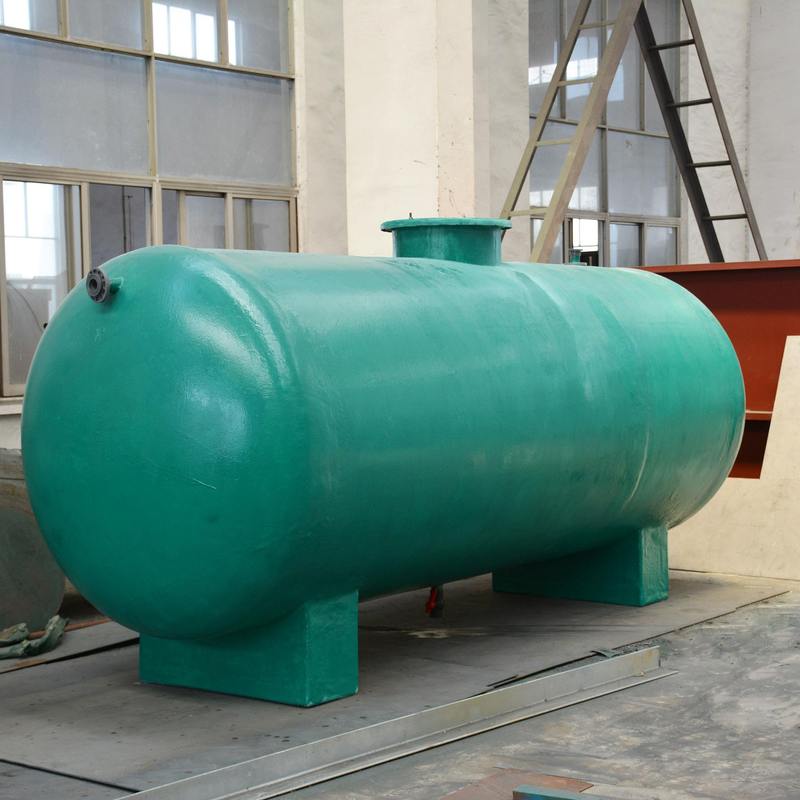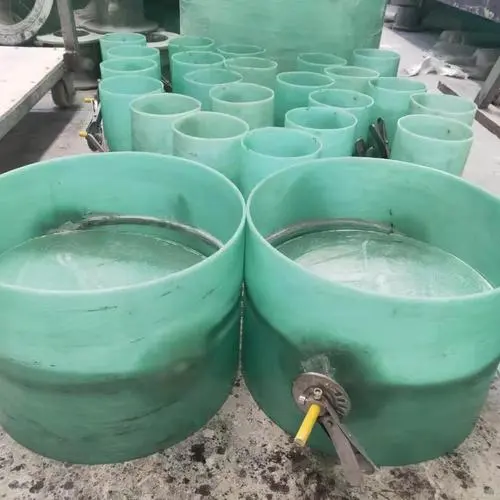Fiberglass tanks are storage containers made from fiberglass, a material created by embedding fine strands of glass in a resin matrix. This unique construction gives fiberglass tanks exceptional strength and resistance to environmental factors like weather, chemicals, and temperature changes. Fiberglass tanks are primarily used for storing liquids, including water, chemicals, oils, and even sewage.

Fiberglass tanks offer numerous benefits that make them ideal for various applications. Below are some of the primary advantages of choosing fiberglass tanks:
One of the most notable benefits of fiberglass tanks is their exceptional resistance to corrosion. Unlike steel or other metals, fiberglass does not rust, which makes it an ideal material for storing corrosive liquids such as chemicals, acids, and wastewater. This corrosion resistance significantly reduces maintenance costs and extends the life of the tank.
Fiberglass tanks are significantly lighter than metal counterparts such as steel or concrete. This makes fiberglass tanks easier to transport and install. Despite their lightweight nature, they are strong and can withstand the pressure of liquids and external forces without compromising structural integrity.
Fiberglass water tanks are highly durable and can last for several decades, even in harsh environments. The material's ability to withstand impact, UV radiation, and temperature fluctuations makes it ideal for long-term use in both indoor and outdoor applications.
Fiberglass tanks can be customized to meet specific requirements. Manufacturers can create fiberglass tanks in various shapes, sizes, and configurations to meet the exact needs of a particular application. Whether you need a small tank for residential use or a large tank for industrial purposes, fiberglass can be molded to fit any space.
While the initial cost of fiberglass tanks may be higher than alternatives like plastic or metal tanks, their long lifespan and low maintenance requirements make them a more cost-effective option in the long run. Fiberglass tanks require fewer repairs and replacements, resulting in lower total cost of ownership over time.
Fiberglass is a relatively environmentally friendly material. Unlike plastic tanks, which can degrade over time and leach chemicals into the environment, fiberglass tanks are more stable and less prone to degradation. In addition, fiberglass is a recyclable material, adding to its overall environmental friendliness.

Fiberglass tanks are used in a variety of industries, thanks to their versatility and reliability. The following are some of the most common applications:
Fiberglass water tanks are widely used for both potable and non-potable water storage. In residential, commercial, and agricultural settings, fiberglass tanks are a popular choice for storing drinking water, irrigation water, and firefighting water. Their ability to resist corrosion ensures that the water remains uncontaminated.
Industries that handle hazardous chemicals often rely on fiberglass tanks for safe storage. Because to their high resistance to corrosion from acids, alkalis, and other aggressive substances, fiberglass tanks are an ideal choice for storing chemicals in laboratories, factories, and wastewater treatment plants.
Fiberglass tanks play a critical role in wastewater treatment processes. They are used to store wastewater and to treat and dispose of waste materials. Their corrosion resistance and ability to withstand harsh chemicals make them an ideal solution for municipal and industrial wastewater treatment facilities.
Fiberglass tanks are often used to store oils and fuels. These tanks are highly resistant to the corrosive effects of petroleum products, ensuring that the stored liquids remain intact without risk of contamination. Fiberglass fuel tanks are also widely used in the automotive and aviation industries.
In the agricultural industry, fiberglass tanks are frequently used to store fertilizers, pesticides, and herbicides. These tanks are ideal for holding liquids that could otherwise corrode metal containers. Their strength and resistance to harsh chemicals make them a popular choice for farmers and agricultural suppliers.
Fiberglass tanks are also used in the food and beverage industry to store ingredients such as oils, syrups, and liquids that need to be preserved in a controlled environment. Their non-reactive surface ensures that no harmful chemicals will leach into the stored products.
When selecting a fiberglass tank for your application, there are several key factors to consider to ensure you choose the right product:
Tank capacity of the tank is one of the most important factors to consider. Make sure the tank is large enough to hold the required amount of liquid but not so large that it takes up unnecessary space. Fiberglass tanks are available in a wide range of capacities, from small residential tanks to large industrial tanks.
Fiberglass tanks can be customized to suit a variety of shapes and designs. Some tanks are cylindrical, while others are square or rectangular. The shape you choose will depend on the space available for installation and the specific requirements of your application.
Different applications may require fiberglass tanks to operate in different temperature conditions. Some fiberglass tanks are designed to withstand high temperature environments, while others are better suited for moderate or low temperature environments. Make sure the tank you choose is suitable for the temperature range of your fluids.
While fiberglass is known for its resistance to corrosion, it's important to choose the right type of resin to ensure the tank can handle the chemicals or liquids you intend to store. Some fiberglass tanks are designed with special resins to resist certain types of chemicals or high acidity.
Fiberglass tanks require minimal maintenance, but it's still important to periodically inspect the tank periodically for any signs of wear or damage. Routine cleaning and maintenance can help extend the life of the tank and ensure that it continues to perform optimally.
For certain applications, such as chemical or food storage, your fiberglass tank may need to meet specific regulatory standards. Make sure the tank you choose meets all relevant industry regulations to ensure safe and legal use.
Fiberglass tanks offer a durable, cost-effective, and environmentally friendly solution for a variety of storage needs. From water storage to chemical containment, these tanks are designed to provide long-lasting performance in demanding environments. When choosing a fiberglass tank, it's important to consider factors such as tank capacity, shape, temperature resistance, and corrosion resistance to ensure you choose the right product for your needs.
If you are looking for a reliable solution for your liquid storage requirements, fiberglass tanks are an excellent choice. Their versatility, strength, and low maintenance make them a valuable asset in many industries. Whether you need a tank for residential use or large industrial storage, fiberglass tanks offer a solution that will stand the test of time.
Experience the brand Trusted by Renowned Companies across the GLOBE.

Pipeco stands at the forefront of the market, recognized as a premier manufacturer, supplier, and exporter specializing in top-tier GRP water tanks, stainless steel water tanks, and SMC manhole covers, FRP Water Tank, Fiberglass Tank, SMC Water Tank committed to delivering unparalleled quality and excellence.